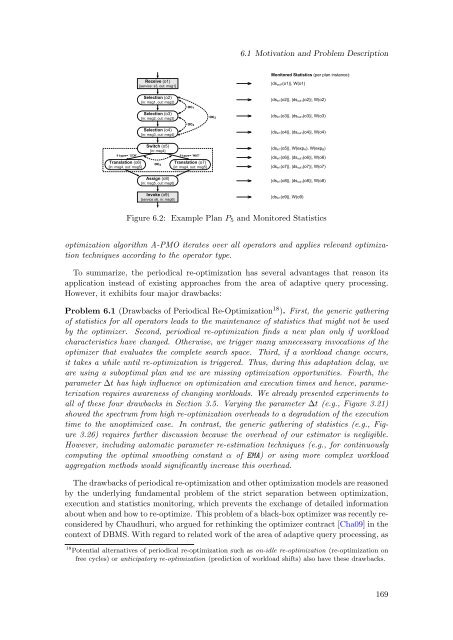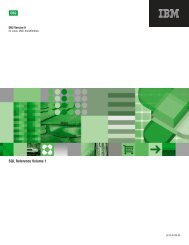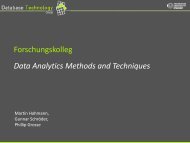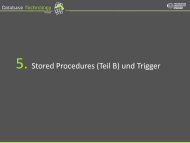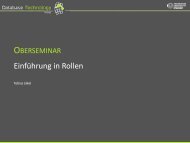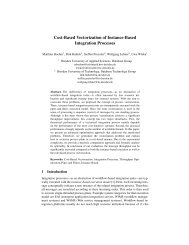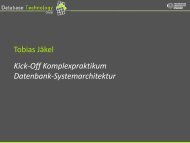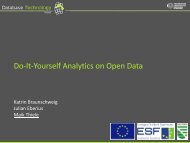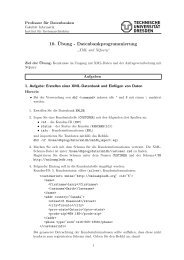Cost-Based Optimization of Integration Flows - Datenbanken ...
Cost-Based Optimization of Integration Flows - Datenbanken ...
Cost-Based Optimization of Integration Flows - Datenbanken ...
- No tags were found...
Create successful ePaper yourself
Turn your PDF publications into a flip-book with our unique Google optimized e-Paper software.
6.1 Motivation and Problem Description<br />
Receive (o1)<br />
[service: s3, out: msg1]<br />
Monitored Statistics (per plan instance):<br />
|dsout1(o1)|, W(o1)<br />
Selection (o2)<br />
[in: msg1, out: msg2]<br />
Selection (o3)<br />
[in: msg2, out: msg3]<br />
Selection (o4)<br />
[in: msg3, out: msg4]<br />
oc1<br />
oc2<br />
oc3<br />
|dsin1(o2)|, |dsout1(o2)|, W(o2)<br />
|dsin1(o3)|, |dsout1(o3)|, W(o3)<br />
|dsin1(o4)|, |dsout1(o4)|, W(o4)<br />
@type='SCM'<br />
Translation (o6)<br />
[in: msg4, out: msg5]<br />
Switch (o5)<br />
[in: msg4]<br />
oc4<br />
@type='MAT'<br />
Translation (o7)<br />
[in: msg4, out: msg5]<br />
|dsin1(o5)|, W(expA), W(expB)<br />
|dsin1(o6)|, |dsout1(o6)|, W(o6)<br />
|dsin1(o7)|, |dsout1(o7)|, W(o7)<br />
Assign (o8)<br />
[in: msg5, out: msg6]<br />
|dsin1(o8)|, |dsout1(o8)|, W(o8)<br />
Invoke (o9)<br />
[service s6, in: msg6]<br />
|dsin1(o9)|, W(o9)<br />
Figure 6.2: Example Plan P 5 and Monitored Statistics<br />
optimization algorithm A-PMO iterates over all operators and applies relevant optimization<br />
techniques according to the operator type.<br />
To summarize, the periodical re-optimization has several advantages that reason its<br />
application instead <strong>of</strong> existing approaches from the area <strong>of</strong> adaptive query processing.<br />
However, it exhibits four major drawbacks:<br />
Problem 6.1 (Drawbacks <strong>of</strong> Periodical Re-<strong>Optimization</strong> 18 ). First, the generic gathering<br />
<strong>of</strong> statistics for all operators leads to the maintenance <strong>of</strong> statistics that might not be used<br />
by the optimizer. Second, periodical re-optimization finds a new plan only if workload<br />
characteristics have changed. Otherwise, we trigger many unnecessary invocations <strong>of</strong> the<br />
optimizer that evaluates the complete search space. Third, if a workload change occurs,<br />
it takes a while until re-optimization is triggered. Thus, during this adaptation delay, we<br />
are using a suboptimal plan and we are missing optimization opportunities. Fourth, the<br />
parameter ∆t has high influence on optimization and execution times and hence, parameterization<br />
requires awareness <strong>of</strong> changing workloads. We already presented experiments to<br />
all <strong>of</strong> these four drawbacks in Section 3.5. Varying the parameter ∆t (e.g., Figure 3.21)<br />
showed the spectrum from high re-optimization overheads to a degradation <strong>of</strong> the execution<br />
time to the unoptimized case. In contrast, the generic gathering <strong>of</strong> statistics (e.g., Figure<br />
3.26) requires further discussion because the overhead <strong>of</strong> our estimator is negligible.<br />
However, including automatic parameter re-estimation techniques (e.g., for continuously<br />
computing the optimal smoothing constant α <strong>of</strong> EMA) or using more complex workload<br />
aggregation methods would significantly increase this overhead.<br />
The drawbacks <strong>of</strong> periodical re-optimization and other optimization models are reasoned<br />
by the underlying fundamental problem <strong>of</strong> the strict separation between optimization,<br />
execution and statistics monitoring, which prevents the exchange <strong>of</strong> detailed information<br />
about when and how to re-optimize. This problem <strong>of</strong> a black-box optimizer was recently reconsidered<br />
by Chaudhuri, who argued for rethinking the optimizer contract [Cha09] in the<br />
context <strong>of</strong> DBMS. With regard to related work <strong>of</strong> the area <strong>of</strong> adaptive query processing, as<br />
18 Potential alternatives <strong>of</strong> periodical re-optimization such as on-idle re-optimization (re-optimization on<br />
free cycles) or anticipatory re-optimization (prediction <strong>of</strong> workload shifts) also have these drawbacks.<br />
169


